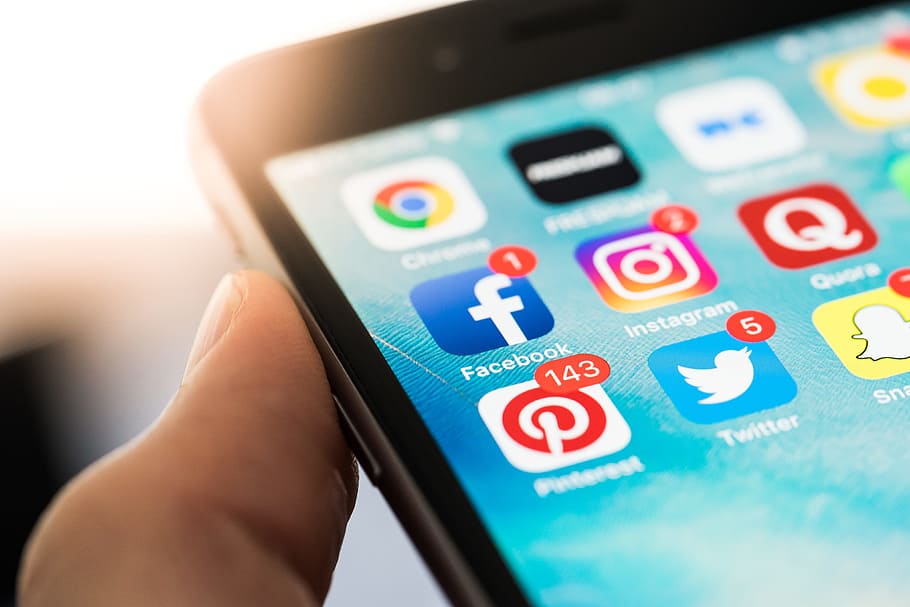Is the growth of technology harmful to humans?
November 16, 2021
I’ll be absolutely honest with you: I am concerned about the future of humanity. There are current trends in our culture that combine to create a very bleak picture of the future, and they begin with social media.
Maybe it’s just me, but I never feel good after a Tik Tok scrolling session. Partly because I’ve just wasted 20 minutes doing nothing productive, but mostly because I’ve spent my time admiring how good other people are, how good their holidays are, how good their singing voices are, but no one wants to discuss the things they’re embarrassed of. Because individuals are hardwired to seek social acceptance and status, 99 percent of what you see on social media are only the highlights.
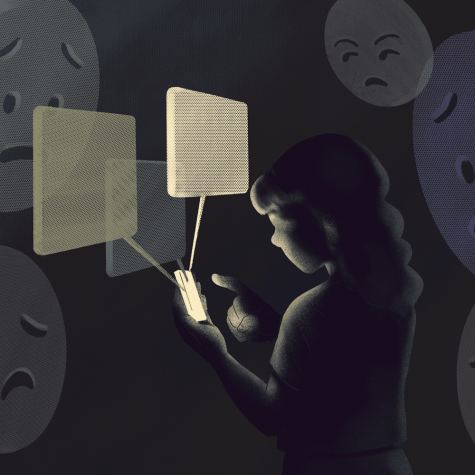
You may want to use social media because it gives you a very short-term high from vicariously experiencing the best parts of other people’s lives, but the negative is that when you return to your own, you’ll feel as if something is missing.
If you are proud of your career, you will disseminate information about it. If you want to appear to be an active traveler, you will post photos of yourself sunbathing on a beach, implying that this is just a usual day in your life and that you are adventurous. You’ll post that unbelievably beautiful sunset you saw while hiking to the top of a mountain, possibly tweaking it along the way to make it appear more bright than it was.
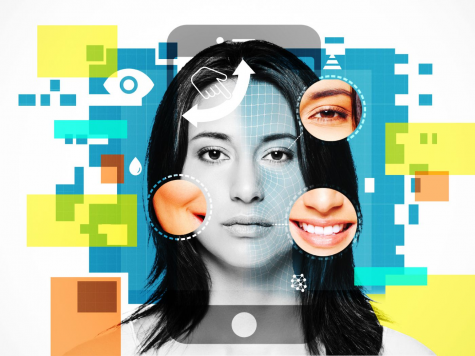 Check out the TikTok filters. This software is so popular because it essentially gives users a limitless toolbox from which to create whatever versions of themselves they wish for everyone else to see. It allows people to create their own stories, and when you combine the idea that you can essentially reinvent yourself online with the feeling that you sort of have to to keep up with how fantastic everyone else’s lives appear to be, it’s easy to see how it makes us feel uneasy about our own.
Check out the TikTok filters. This software is so popular because it essentially gives users a limitless toolbox from which to create whatever versions of themselves they wish for everyone else to see. It allows people to create their own stories, and when you combine the idea that you can essentially reinvent yourself online with the feeling that you sort of have to to keep up with how fantastic everyone else’s lives appear to be, it’s easy to see how it makes us feel uneasy about our own.
We’ve gone from comparing our imperfect lives to the flawed lives of our five or six neighbors to now comparing our imperfect lives to a curated collection of the most ideal moments from a much broader pool of people, and it’s a battle we’ll never win. What’s more alarming is that the programs’ entire objective is not aligned with you either.
Every program you use has the same basic goal: “how can we keep you on for as long as possible” since that is how they get the greatest value from you. Whether it’s Amazon enticing you to buy more products or Facebook enticing you to swipe through as many ads as possible. Consider this: what is the best way to keep someone on your app for a longer period of time? Throw them down a rabbit hole?
According to a BBC news reporter, “apps are getting better and better at learning about their users and then using that information to deliver them similar content made for them, and in the short term this makes our lives easier.“
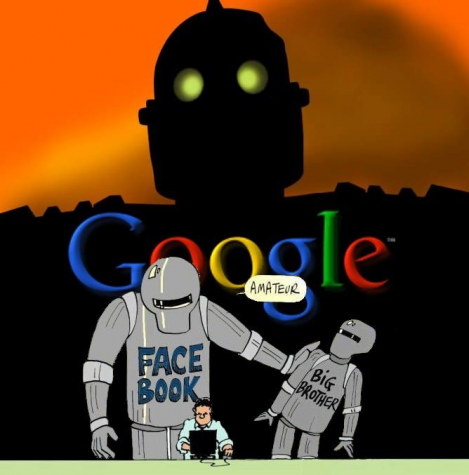
I feel it has an effect on people. Assume I’m looking for a new phone and come across a video in which someone asserts that Apple is superior to Samsung on YouTube. Assume I watch the entire video because I’m interested and want to know what phone to get, and at the end I find myself agreeing with this guy. As time passes, I realize I now have a preference, and I’m more likely to click on a pro-Apple video because it aligns with my present viewpoint. As a result, YouTube will provide me with more and more content to support this, and my preference will get stronger over time. I’ll start following pro-Apple Twitter accounts. I start tweeting pro-Apple tweets until other pro-Apple fans find my page, follow me, and start commenting on my posts, telling me how correct I am. My purchase history fills up with Apple because platforms like Amazon know that if they show me Apple, they’ll get a higher click-through rate, and before long I’m not just buying their phones but also their Ipads, MacBooks, and their entire lineup, and I’m so certain that I’m making the right decision by supporting Apple that I won’t even listen to another outside opinion. At this point, if someone even suggests that Samsung is superior, I will immediately go on the offensive on Apple’s side.
An abstract example: Yes. But can you identify what’s going on just on a chance meeting with one video? I’ve been funneled into feeling so strongly about something that I’m sure I’d be unbearable to someone who didn’t share my feelings. I’ve been persuaded that I’m in a separate group than someone who holds a different opinion, but what’s troubling is that this is acceptable online. The internet increasingly has the power to filter out everything that would question your beliefs while simultaneously surrounding you with things that support your beliefs.
Because it has an incentive to do so, everyone online is in their own little bubble of information and perspectives, and they’re effectively being pushed in whatever way keeps them interested and makes platforms the most money. This is why social media networks are deleting single shared home pages and any other location where you may not be receiving the most personalized content.
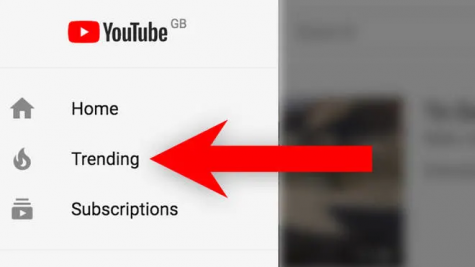
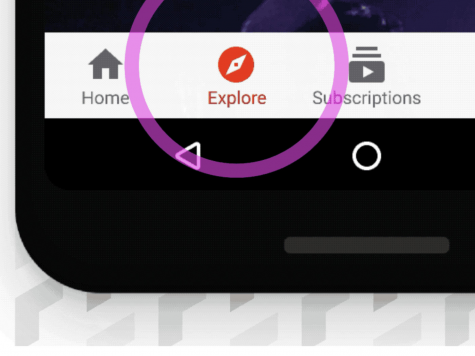
Why would they provide you with generic posts that are less likely to appeal to you and, as a result, are more likely to drive you away from their platform?
Phones are one thing, but when it comes to real-world issues like politics, abortion, climate change, and nuclear power, this divide becomes huge, and I feel that much of it is undermining our ability to comprehend and negotiate.
The vast majority of what we are being encouraged to read and watch has a strong motivation to be negative. We are hardwired as humans to value negative information more than positive information. Because in the past, negative information was viewed as if it were a predator, to which we had to react immediately. As an example I guarantee that if CNN published two posts right now, one explaining why Joe Biden is doing a very good job and the other showing why Joe Biden is failing, the failing one would receive at least twice the number of views. This is the primary explanation for why the majority of the news we receive is negative.
If I am not interested in learning about a particular issue because I believe I already know everything about it, the internet will never serve it to me. If I believe the world is flat, I am less likely to interact with material that contradicts my idea. On the internet, we can not only constantly surround ourselves with people who agree with us, but we can also distance ourselves from people who disagree with us, and as a result, all of the correctional mechanisms that exist in a normal in-person society, such as friends telling you that you’re being stupid or that you simply haven’t considered another point of view, vanish. They’re crumbling. We now have the power to avoid being informed that we are wrong, resulting in not only severely unfavorably biased opinions on topics we don’t fully comprehend, but also an even more inflated sense of confidence in such ideas.
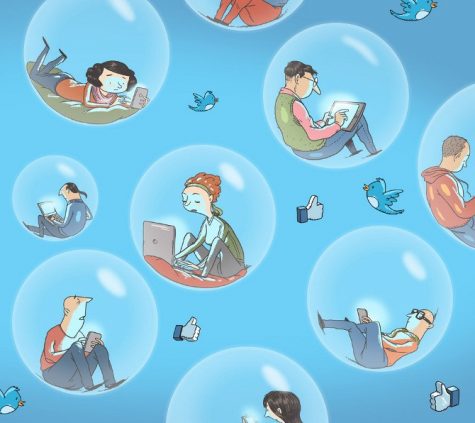
You can see a future in which people are only divided into black and white, us vs. them ideas, but are easily irritated by those who disagree because they’re so confident they’re right and how negatively they’ve been conditioned to think about the other side. In their personal life, they actually feel as though they want to push others down a notch, which leads to this scorn for others, along with the possibility to obtain more social affirmation from our bedrooms.
Knox Hill, a well-known YouTuber, made a video screaming about how social media is changing society for the worst (video link: https://youtu.be/9csNYT5z-DE), and he was even featured on NYC 1 news back in August, saying things like, “Our smart devices in general are becoming so good at doing things that we no longer need other people. We no longer require Grandma’s delectable passion fruit pie recipe. We don’t need friends’ opinions when I can easily find the best pie on the internet. We don’t need to stop and ask for directions because Google Maps is more dependable. We have Facebook groups that are tailored to give us the replies we want to hear, and I am confident that AI will one day do the majority of our work. Drones will be able to deliver packages faster than humans, and cars will be able to drive themselves more rigorously without our intervention. Once an AI has learned how to do anything, such as becoming an influencer, they will never need to be taught again. Instead of requiring a new person to attend school for 15 years, then university, then training, the moment a machine becomes capable of performing the same operation, you can simply copy and paste that data to as many machines as you want in minutes.”
While technology improves dramatically each year, humans and the level of stimulation that we can provide to each other remains relatively constant, so if each generation adjusts to the new level of stimulation that the current era of technology can provide, it’s not that the tech is going to start feeling better and making us happier it’s that the humans around us will just start to feel worse.
An example of this happening is that a few months ago, WhatsApp released an update that allowed you to listen to people’s voice notes at 1.5 times and even two times the speed. On one hand, this is a great feature because now we can get even more done. On the other hand, imagine how it’s going to feel now going from that to then trying to have an in-person conversation. You’d probably fall asleep. You’ll get so used to them talking faster, delivering information to you quicker, and so on, that the real-life version of them is actually not as interesting to you.
For a personal example, video games. When the pandemic lockdown started, my friends and I started playing a game with each other once a week. We’d log on at the same time, plug our headsets in, and play together. I’m not trying to make a disparaging statement; we enjoyed some of the most memorable shared moments of our friendship while playing this game. We collaborated, overcame obstacles, and had fantastic conversations while playing, but then I saw something unexpected. I found myself asking, “Why would I spend a full day traveling back and forth miles to be able to have a conversation with people I could have a perfectly good conversation with from my bedroom while also being immersed in this highly stimulating video game with multiple interlocking systems to keep me engaged at all times?”
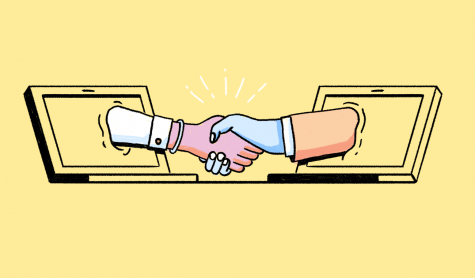
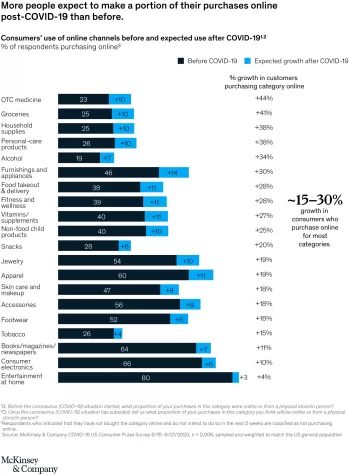 Another thing I noticed during the pandemic is that online shopping has boosted a lot, I understand that there are still a significant number of people who prefer the in-person experience, but if you look at the demographics, young people today are very much of the opinion that all shopping should be done online. I have no doubt that most babies who have just been born will not even consider shopping in person because it will not make sense to them, such as why would they walk to an in-person shop when they can tap a few keys and get exactly what they want delivered to their doors.
Another thing I noticed during the pandemic is that online shopping has boosted a lot, I understand that there are still a significant number of people who prefer the in-person experience, but if you look at the demographics, young people today are very much of the opinion that all shopping should be done online. I have no doubt that most babies who have just been born will not even consider shopping in person because it will not make sense to them, such as why would they walk to an in-person shop when they can tap a few keys and get exactly what they want delivered to their doors.
Technically speaking, they make sense; they’re logical; for example, why would a company risk making a live in-person presentation when they can pre-record it, edit it, and make sure it’s perfect?; why would you force people to waste time going into work when they can do their job from the comfort of their own homes? I’m not saying that isolation is being forced upon us; rather, it’s that we are choosing isolation because, as technology improves, isolation makes our lives easier.
If you think about it, thousands of angry people projecting their voices to actively try and ruin someone else’s life, usually someone who is considered to be successful, is pretty much the logical conclusion to everything we’ve discussed so far. All you have to do is log on to Twitter and a trending topic over which people are verbally molesting each other over. Two sides with completely different views who not only disagree but seem to be trying to bind each other together.
However, the most frightening aspect of this is that they may be debating over something that never occurred or is fake. On the one hand, you can understand how individuals might fabricate recordings of people, in order to stir up controversy, but that line blurs when those in positions of power, such as the government, begin to use technologies such as deep fakes to their benefit.
As an example, earlier this year, millions of viewers across South Korea tuned into their local news channel as they always do, and the usual presenter Kim Juha was there, as you’d expect, just sort of talking through the top stories, but in fact, Kim Joo-Ha was not present; she had been replaced by a deep fake version of herself that could perfectly mimic her facial expressions and gesticulations.
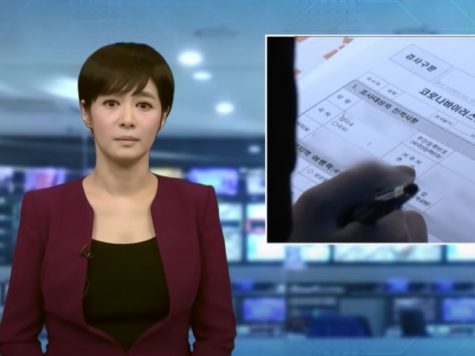

In a completely virtual world, it will be impossible to tell the difference between what is real and what is not, and to some extent, it may not even matter that your life exists. We are in the midst of a technological revolution; technology is speeding, rocketing, and spiraling in all directions, and no one really wants it to come to a halt, right? A more efficient economy, better healthcare, and a more effective military are all benefits of improved technology, which comes at the same time that our lives begin to become increasingly digital.
Digital hobbies are some of our favorite ways to pass time. Our digital connections can even go up to being criminal acts. In order to protect children, digital companies and governments are going to want to regulate in a way that we haven’t seen before. For example, did you see Apple’s policy update a few months ago, in which they announced that they would begin scanning images from your Apple devices to see if they matched with records of child abuse victims? If there are any matches, they have said that they would report your account to law police as potentially being a child abuser. You might respond, “Of course, simply don’t abuse children,” which is a simple principle to follow, but can you see how this may be a slippery slope? Consider the possibility that, in the future, governments will begin to pressurize companies to police not only crimes, but also non-criminal behaviors that they do not want to see repeated. What if you could be arrested simply for searching for something you were interested in because your search was attributed to you being a risk factor to society?
This may seem extreme, but it is already happening in China. Chinese citizens are already evaluated based on their good deeds, at least as far as the government is concerned, and their bad deeds. I don’t mean things like committing crimes, I mean things like crossing the road in the wrong place or playing your music too loud in public. In China, right now, behaving in a way that is even slightly suboptimal to society can literally affect your rights, and this is especially true for minorities. If you’re a citizen in China right now your social points can affect your ability to book flights, board trains, and seek medical attention, etc.
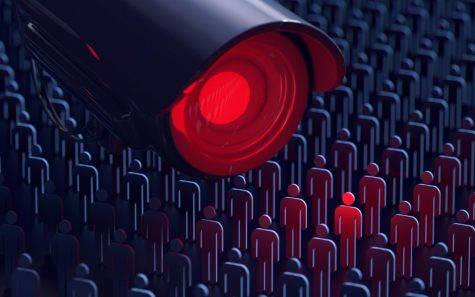
Even if you may argue that this is unique to China, the truth is that the fundamental components of the system are already in place across a number of other nations. If you don’t have a decent credit rating in the US, you won’t be able to receive a loan, and if you don’t have a good Uber score, you won’t be able to get a lift. You didn’t get the best grades in school. You will not be admitted to university, because systems like these, when seen from a macro viewpoint, enable society to operate more effectively.
Although China has an extreme level of population control, this is only possible because of how close they have gotten to their technology, and we’re only getting closer. We’re moving well beyond the age where a computer is just this big box that sits under your desk; we’re moving towards ambient computing, an era where everything we use is a computer and everything is connected all of the time collecting data to optimize itself, and this is something I think about quite a lot.
I realize this sounds very eye-rolling and almost conspiracy theory level, but just look at Facebook. All the average user thinks about is, “ah yeah I just got a friend request from (x)” or “O,h person (y) just liked my post this is so great”, but the truth of it is this is a hyper-intelligent piece of software designed by some of the smartest minds on the planet to manipulate prehistoric parts of our mind towards behaving in a way that’s conducive to profit. The point is as the tech becomes more sophisticated, so will the way we’re being watched by it, and the higher the chance that the tech becomes so complex and nuanced that it will be able to run circles around our own limited brain capacities.
I can see technology concentrating power in the hands of a select few who own and understand it, leaving the vast majority of the population bickering amongst themselves but never seeing the bigger picture. The future is going to be a true test of who you trust, because when the mechanisms of technology are incomprehensible to the average citizen, you’re forced to trust someone who does understand it.
I don’t want that to be the end result, however, I’m not proposing we should stop technological advancement entirely. Tech has been my single main passion since I was about 11 years old, so I’m not trying to say it’s not exciting, but what I’m trying to say is that I think it’s worth taking a step back every now and then to remind ourselves what’s going on behind the scenes. If you feel like your life isn’t good enough because of what you see on social media, that’s not just you, a large majority of people feel like that half the time. For example if you feel bad because you’ve just wasted two hours watching tik tok videos about life hacks that probably don’t work, that’s not you being chronically unproductive, that’s tik tok being very good at its job.
